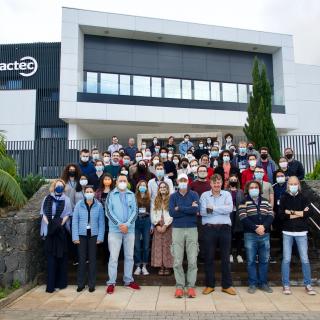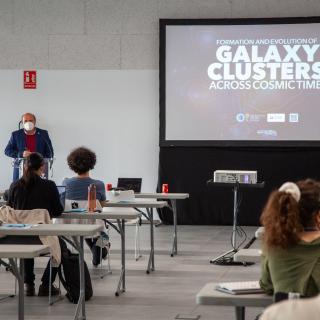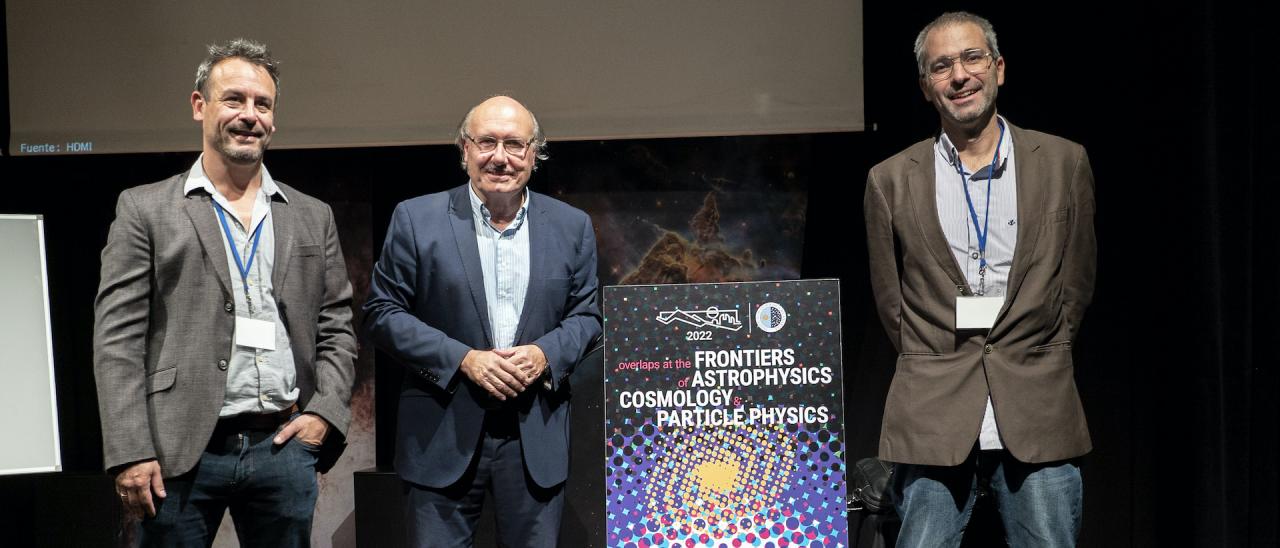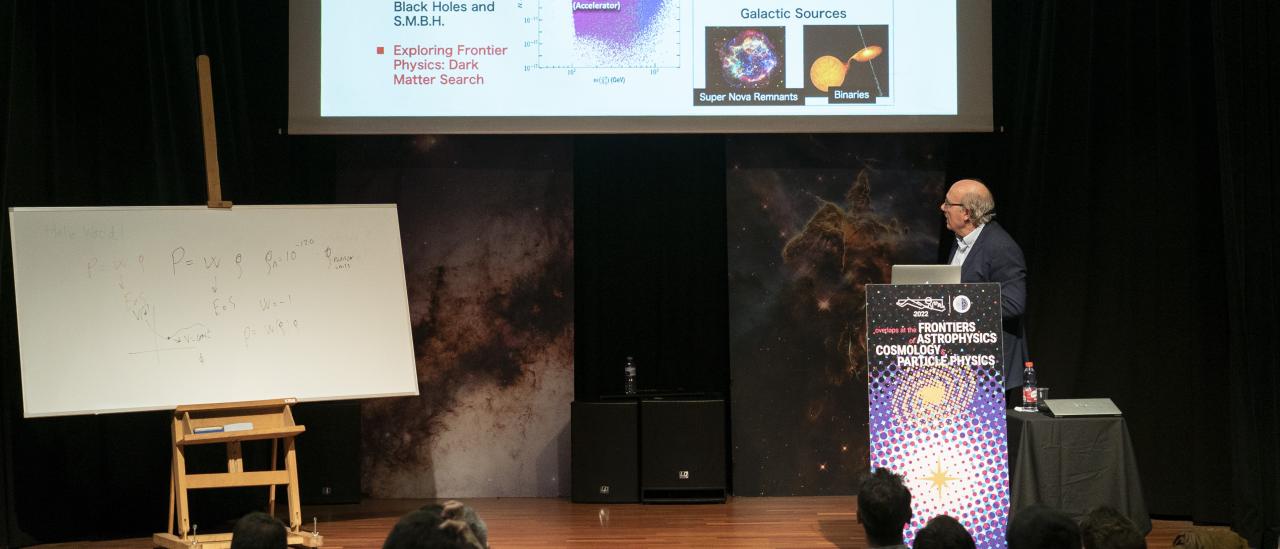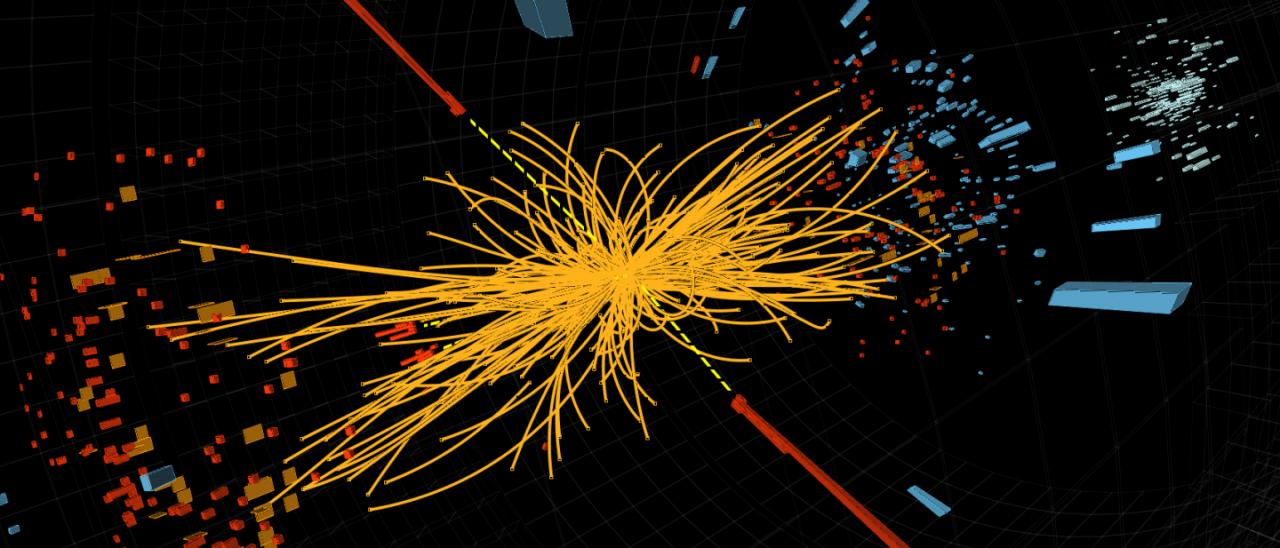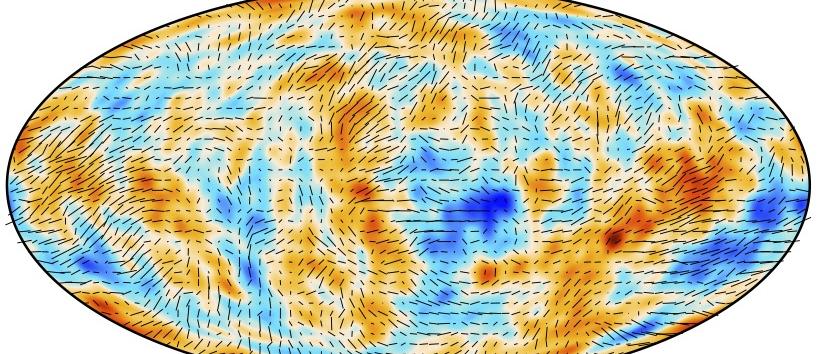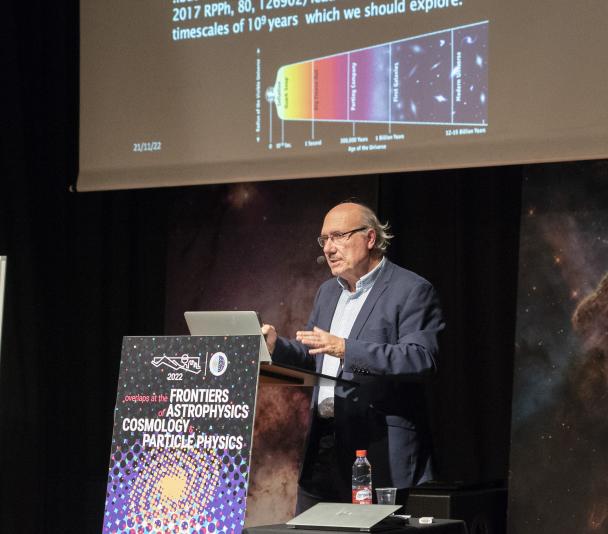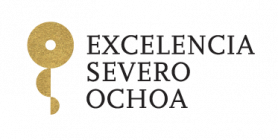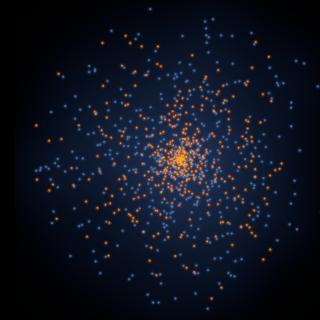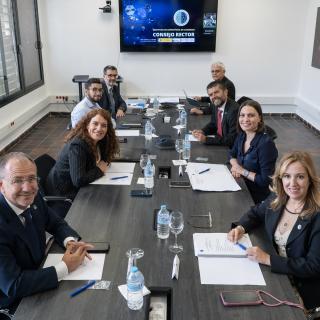From 21th November till 2nd December at the Museo de la Ciencia y el Cosmos (San Cristóbal de La Laguna), and organised by the Instituto de Astrofísica de Canarias
The 33rd edition of the Winter School of the Instituto de Astrofísica de Canarias will focus on the efforts of astrophysics, cosmology and particle physics to understand the mysteries of the dark universe.
The XXXIII Canary Islands Winter School of Astrophysics, which is taking place between November 21st and December 2nd, was inaugurated yesterday in the Museo de la Ciencia y el Cosmos, with a welcome address by Rafael Rebolo, Director of the Instituto de Astrofísica de Canarias (IAC).
The basic aim of this School is to discuss the nature of dark matter, the nature of dark energy, and the validity of the standard model of particle physics. There are three different approaches to these big questions of fundamental physics: astrophysics, cosmology, and particle physics.
Rebolo noted that “the interaction among these fields is not often discussed, and seen from a transversal point of view it is the ideal nursery for generating new ideas which will allow simultaneous advances in all three of them”. He added that “it would be very convenient if there were frequent forums and areas in which the experts could interact with young researchers. This School is an excellent opportunity for all of them”.
In this thirty-third edition, the Winter School includes over seventeen world-renowned experts in the relevant areas, and over 60 doctoral students and postdoctoral researchers, five of them with IAC studentships, from 17 different countries. The chosen formats seek to promote knowledge exchange and interaction between lecturers and students, with seminars, debates, master classes, and also public talks.
The participants will also enjoy a set of additional activities such as visits to the Teide Observatory (Tenerife) and the Roque de los Muchachos Observatory (La Palma) on November 26th and December 3rd respectively.
In the words of Carlos Hernández Monteagudo and Jorge Martín Camalich, researchers at the IAC and the organisers of the present edition of the School, “It is exciting to see the same frontiers of knowledge from different but converging perspectives of physics, and to understand how each branch uses different methods to face the same challenges”.
Associated with the School there will be two public talks in the lecture theatre of the Museo de la Ciencia y el Cosmos:
- Rebecca Collins, of the University of Edinburgh and the Instituto de Física Teórica (Universidad Autónoma de Madrid), and David G. Cerdeño of the Instituto de Física Teórica (Universidad Autónoma de Madrid), “Listening to dark matter”, on Friday 25th November at 18.30. (only in Spanish)
- Prof. Malcolm Longair, of the Cavendish Laboratory (University of Cambridge), “Challenges of contemporary cosmology” on Friday 2nd December a las 18.30. (only in English).
The XXXIII Canary Islands Winter School of Astrophysics, promoted by the IAC with the contribution of the Severo Ochoa programme, has support from the Ministerio de Ciencia e Innovacion and the collaboration of the Museo de la Ciencia y el Cosmos and the Universidad de La Laguna.
The unknowns of our Universe
Only 5% of the energy in the Universe comprises the type of matter with which human beings are familiar, the rest is termed the dark universe, in theory composed of what is known as dark matter and dark energy.
Cosmology studies the observable universe as a whole, using the tools of astrophysics. Thanks to observations we can obtain data from which we can infer that the expansion of the universe is accelerating, whose cause is termed dark energy. Certain astrophysical systems (supernovas, dwarf galaxies, neutron stars…) whose distribution can be observed may give us indication about the natures of dark matter and dark energy, which in turn are linked to new knowledge in particle physics.
Particle physics researches the nature of the smallest scales which we can study, in particular with particle accelerators built on Earth. Each time that we go to smaller scales we explore higher energies, which correspond to increasingly fundamental components of nature. If the known laws had operated within the Universe since its beginning all matter would have annihilated itself by combining with antimatter and the Universe today would be filled only with radiation. The laws of physics which produced the primordial asymmetry, which accounts for our existence and that of everything we can perceive, remain unknown.
Lecturers and topics
Public talk: Listening to dark matter, given by Rebecca Collins and David G. Cerdeño. Friday 25th November, 18.30. Museo de la Ciencia y el Cosmos. (only in Spanish)
Public talk: Challenges of contemporary cosmology, given by Prof. Malcolm Longair. Friday 2nd December at 18.30. Museo de la Ciencia y el Cosmos. (only in English)
Prof Benjamín Grinstein, University of California-San Diego: Overview on current status of Particle Physics
David G. Cerdeño, Instituto de Física Teórica - Universidad Autónoma de Madrid: Overview on Astroparticles in Cosmology
Prof Fabio Finelli, INAF – Bologna: Fundamental Physics with the Cosmic Microwave Background
Prof Luca Amendola, University of Heidelberg: Dark Energy - theoretical and observational status
Prof Matteo Viel, SISSA – Trieste: Fundamental Physics with Large Scale Structure
Prof Kfir Blum, Weizmann Institute of Science – Rehovot: Fundamental Physics with galaxies
Prof Valerie Domcke, CERN – Geneva: Early Universe and Inflation
Prof Tracy Slatyer, MIT – Cambridge: Dark Matter - theoretical and observational status
Prof Francesca Calore, LAPTh – Annecy: Fundamental Physics with cosmic rays and gamma rays
Prof Olga Mena, IFIC – Valencia: Neutrinos in Cosmology and astrophysics
Prof Vitor Cardoso, CENTRA/IST - Lisboa & Niels Bohr Institute – Copenhaghen: Gravitational Waves
Prof Diego Blas, IFAE -Barcelona: Closure talk
Prof Malcolm Longair, Cavendish Laboratory - University of Cambridge: Progress on Astrophysics and Cosmology over the last 100 years
Prof Raul Angulo, Donostia International Physics Center: Master Class - Cosmological Dark Matter Simulations
Prof Arianna Di Cintio, University of La Laguna & IAC: Master Class - Galaxy Simulations
Prof Francisco-Shu Kitaura, University of La Laguna & IAC: Master Class - Reconstruction of the Initial Conditions
Prof Rebecca Collins, University of Edinburgh & Instituto de Física Teórica (Universidad Autónoma de Madrid): Master Class - Art & Science: Strategies for Scientific Outreach
Organizing Committee
Carlos Hernández-Monteagudo (Co-Director of the School)
Jorge Martin Camalich (Co-Director of the School)
Basilio Ruiz Cobo (Head of the IAC Graduate Studies division)
Rafael Rebolo (Director of the IAC)
Press contact
uc3 [at] iac.es (uc3[at]iac[dot]es)
Winter School website: https://research.iac.es/winterschool/2022/
